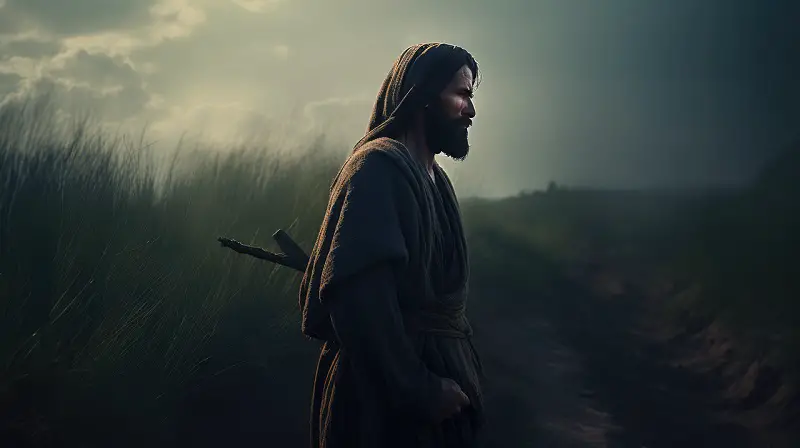Throughout history, the Bible has served as a cornerstone of faith and morality for millions, offering profound insights and timeless lessons.
Yet, nestled within its revered pages are not just tales of divine power but also poignant examples of limitations—both human and spiritual—that resonate with our own experiences today.
From the frailties of its most celebrated figures to the constraints imposed by societal norms, these narratives challenge us to confront our own boundaries and imperfections.
In exploring the different examples of limitations in the Bible, we uncover a rich tapestry that highlights vulnerability as an intrinsic part of the human condition.
These stories remind us that even those chosen for greatness faced challenges that tested their resolve and faith.
By delving into these accounts, we can better understand how limitations shape our journeys and inspire growth in ways we might never have anticipated.
Join me as we unpack these intriguing narratives that blend struggle with resilience, revealing how they continue to speak to us across centuries.
The Different Examples of Limitations in the Bible

By examining these biblical examples, you can gain insights into how limitations can be a tool for strength, humility, and personal development.
✅ 3 Examples of Physical Limitations in the Bible
Physical limitations in the Bible often serve as reminders of human dependence on God.
These examples include disabilities, health struggles, or physical obstacles that limit an individual’s abilities and are opportunities to trust in God’s strength.
Moses’ Speech Impediment
Moses, often revered as a formidable leader and prophet, was not without his challenges.
His speech impediment, mentioned in Exodus 4:10, has been a topic of both theological study and psychological reflection.
Here lies a striking example of how physical limitations can coexist with profound purpose; despite his struggles with eloquence, Moses went on to deliver the tenets of faith that would shape an entire nation.
This paradox reveals a critical element of biblical narratives—how individuals overcome their perceived shortcomings through divine purpose.
The beauty of Moses’ story is that it transcends the specific context of ancient times; it serves as an archetype for anyone grappling with self-doubt against the backdrop of great expectations.
It forces us to confront our biases about ability and effectiveness.
Through Moses, we see that limitations are not necessarily barriers but rather invitations to rely on attributes beyond ourselves—like faith and community support.
Just as God provided Aaron to speak for Moses, today’s individuals can find allies who complement their strengths and weaknesses in pursuing meaningful goals.
In examining examples of physical limitations in the Bible beyond Moses—including Jacob’s limp after wrestling with God or Paul’s “thorn in the flesh”—we uncover a nuanced portrait where imperfection does not equate to incapacity.
These constraints often catalyze deeper connections within communities and foster resilience among others facing similar challenges.
Ultimately, these stories compel us to reassess what it means to be truly capable; perhaps success lies less in flawless execution and more in the authenticity we bring as imperfect beings striving towards something greater than ourselves.
Paul’s “Thorn in the Flesh”
Paul’s “thorn in the flesh” has captivated theologians and laypeople alike, serving as a profound reminder of human vulnerability.
This enigmatic phrase invites us to speculate about its true nature; while many scholars suggest it may refer to a physical ailment, such as poor eyesight or chronic pain, others propose it as an emotional or spiritual struggle—perhaps anxiety or despair tied to his relentless mission.
This duality prompts reflection on our own limitations, reminding us that even the most dedicated servants of God are not exempt from suffering.
Examples of physical limitations in the Bible abound, reinforcing this theme: Moses’ speech impediment didn’t hinder him from leading his people out of Egypt, while Jacob’s limp became a testament to his divine encounter.
Paul’s acknowledgment of his struggles serves not only as a personal testimony but also paints a broader portrait of faith’s resilience amid affliction.
It forces us to confront the idea that weakness might cultivate strength; often through our thorns, we awaken greater empathy and understanding within ourselves and towards others.
Such insights compel believers to view their own challenges not just as obstacles but as vital components in their spiritual journey toward growth and deeper connection with God.
Jacob’s Limp
Jacob’s limp serves as a profound symbol of resilience and transformation, embodying the complex interplay between physical limitations and spiritual growth in biblical narratives.
After wrestling with an angel until daybreak, Jacob was left with a tangible reminder of his struggle—a limp that would accompany him for the rest of his life.
This encounter not only marked a pivotal moment in his journey but also suggested that our weaknesses can serve as catalysts for deeper understanding and connection to faith.
His physical limitation transformed into a badge of honor, urging him to embrace vulnerability while navigating life’s challenges.
Exploring examples of physical limitations in the Bible reveals how these constraints often lead to divine encounters or moments of revelation.
Moses had a speech impediment yet became one of the greatest leaders in Israelite history; Saul was initially paralyzed by fear before becoming King David’s fiercest ally.
Jacob’s limp thus highlights an essential truth: that flaws and frailties are integral to our narratives rather than mere obstacles.
By embracing such imperfections, we unlock growth potential and deepen our relationship with God—reminding us that it is through our struggles that we often find purpose, community, and ultimately, redemption.
✅ 3 Examples of Moral Limitations in the Bible

Moral limitations in the Bible are often commandments or instructions from God that dictate ethical and moral boundaries.
These serve as guidance on how to live a righteous life, often highlighting the consequences of overstepping these bounds.
The Garden of Eden
The Garden of Eden, often depicted as a paradise unmarred by human sin, serves as a profound metaphor for the moral limitations that permeate biblical narratives.
Within its lush landscape lies the rich symbolism of choice and consequence, encapsulated in the fateful moment when Adam and Eve succumbed to temptation.
This pivotal act does not merely signify disobedience; it highlights humanity’s intrinsic struggle with moral boundaries.
By reaching for forbidden knowledge, they inadvertently set off a chain reaction that resonates throughout scripture—inviting readers to reflect on their own ethical dilemmas.
Eden is not just a physical location but an allegorical space representing the conflict between desire and duty.
The prohibition against eating from the Tree of Knowledge underscores humanity’s fragile relationship with moral autonomy; it reveals how much can be at stake when one defines a personal understanding of good and evil outside divine guidelines.
In this light, Eden becomes an eternal reminder that even within seemingly idyllic circumstances, moral limitations exist, prompting individuals to question what truly constitutes ethical behavior in their lives today.
By exploring these themes woven through biblical examples—such as Cain’s envy leading to Abel’s demise—we recognize how these foundational stories continue to shape our comprehension of morality in an increasingly complex world.
The Ten Commandments
The Ten Commandments stand as a cornerstone of moral guidance within Judeo-Christian traditions, offering a profound examination of the ethical limits imposed on human behavior.
Each commandment encapsulates fundamental principles that not only shaped ancient societies but continue to resonate today.
For instance, “Thou shalt not steal” transcends mere prohibition, inviting an exploration into the deeper implications of respect for individual rights and the sanctity of personal property.
It serves as a reminder that integrity fosters trust, which is vital for thriving communities.
More than just rules etched in stone, these commandments challenge us to reflect on our actions and their repercussions in contemporary life.
They speak volumes about societal cohesion by highlighting shared values like honesty, fidelity, and community welfare.
In an era where moral relativism often complicates ethical judgments, revisiting these ancient directives can provide clarity—a reminder that certain limitations are indeed necessary for mutual respect and understanding among diverse populations.
Ultimately, engaging with examples of moral limitations in the Bible encourages us to contemplate how we navigate modern dilemmas while remaining anchored in time-honored ideals that promote human dignity and harmony.
Saul’s Disobedience
Saul’s disobedience stands as a poignant exploration of moral limitations in the Bible, revealing how even the chosen can falter under pressure.
His failure to fully obey God’s command to destroy the Amalekites serves as a profound lesson on the repercussions of selective obedience.
Saul rationalized his actions by claiming he saved the best livestock for sacrifices, yet this act of compromise underscored a deeper struggle within him—a prioritization of appearances over pure devotion.
The narrative prompts readers to reflect on their own lives: how often do we justify our choices while neglecting ethical imperatives?
Moreover, Saul’s descent from favor speaks to humanity’s inherent vulnerabilities when confronted with authority or social expectations.
While striving for leadership and acceptance, he ultimately succumbed to fear and ambition rather than divine guidance.
This clash between human desires and divine commandments raises crucial questions about integrity and accountability.
Through Saul’s story, we are invited to examine our thresholds for righteousness—challenging us to recognize that moral clarity can be overshadowed by personal gain or societal pressures, reminding us that true discernment requires an unwavering commitment beyond mere compliance with rules.
✅ 3 Examples of Spiritual Limitations in the Bible

Spiritual limitations in the Bible often appear as struggles with faith, doubt, or understanding. These constraints highlight the human tendency to wrestle with belief and dependence on God.
Doubting Thomas
The story of Doubting Thomas serves as a poignant reminder of our human propensity for skepticism, especially when faced with the extraordinary.
In the Gospel according to John, Thomas expresses doubt about Jesus’ resurrection, declaring that he must see and touch the wounds to believe.
This narrative highlights not only his personal struggle but also reflects a larger theme found throughout the Bible: examples of spiritual limitations often stem from our inability to accept concepts beyond our immediate understanding or experience.
Thomas becomes emblematic of those who seek tangible proof in an age where faith is frequently demanded without it.
Moreover, this moment offers profound insights into the nature of belief itself. Jesus’ response—“Blessed are those who have not seen and yet have believed”—serves as an invitation to deepen one’s faith despite uncertainty.
It challenges us to ponder how many spiritual limitations we impose on ourselves by demanding empirical evidence before embracing deeper truths.
By acknowledging our doubts rather than suppressing them, we open up pathways for growth and transformation, inviting revelations that transcend mere facts and figures—a powerful lesson conveyed through a figure often misunderstood in his quest for certainty.
Thus, Doubting Thomas isn’t just about disbelief; it’s a gateway to exploring what happens when we invite vulnerability into our spiritual journeys.
Peter’s Denial
Peter’s denial serves as a profound example of spiritual limitations in the Bible, illustrating the frailty of human resolve even amidst devotion.
This pivotal moment unfolds during a time of intense pressure and fear, highlighting how external circumstances can quickly unravel one’s faith. Peter, who had boldly professed his loyalty to Jesus, crumbles when faced with the threat of persecution.
This demonstrates that even those closest to divine calling are not immune to doubt and cowardice; it’s a reminder that spiritual strength is often tested in our weakest moments.
What makes this event particularly poignant is the transformational aftermath of Peter’s denial. Rather than being condemned for his failure, he receives grace and restoration from Jesus post-resurrection, emphasizing a critical theme in biblical narratives: redemption amid weakness.
This cycle—recognition of limitation followed by grace—offers profound insights into our own spiritual journeys.
We may find ourselves resonating with Peter’s struggle; his vulnerability encourages us to embrace our imperfections as part of growth rather than barriers to it.
Ultimately, Peter’s journey illustrates that acknowledging our failures can ignite true spiritual awakening and lead us toward a deeper understanding of grace—a testament that we are never beyond redemption’s reach despite our darkest moments.
The Israelites’ Doubt in the Wilderness
Amidst the harsh realities of wilderness life, the Israelites’ doubts transformed a journey of liberation into one riddled with uncertainty.
This period serves as a profound reflection on spiritual limitations in the Bible; despite witnessing miraculous signs—such as parting seas and Heavenly manna—many lost faith when facing adversity.
Their yearning for comforts left behind in Egypt illuminated a common human tendency: to prioritize immediate security over faith in unseen promise.
This paradox reveals how doubt can cloud vision, challenging divine purpose even amid blessings.
Furthermore, their collective anxiety invites readers to consider personal wilderness moments; times when hope wanes under life’s pressures.
Just as they sought tangible signs from God, we often look for concrete evidence of His presence during trials.
Yet, perhaps it’s within those very struggles that spiritual resilience is forged—a transformative process that calls us away from fleeting desires towards deeper trust and understanding.
In recognizing these examples of spiritual limitations in the Bible alongside our own doubts, we cultivate empathy, allowing ourselves to navigate our journeys more thoughtfully and faithfully.
✅ The Consequences of Overcoming or Ignoring Limitations

The Bible presents examples of individuals who either overcome their limitations through faith or suffer because of ignoring them.
These stories illustrate the power of limitations as both a challenge and a stepping stone.
David and Goliath
In the epic confrontation between David and Goliath, we witness a compelling narrative that explores not just physical might, but the profound power of faith.
David’s stature and experience pale in comparison to that of Goliath, whose intimidating presence sends shivers through the heart of Israel’s army.
However, what David lacks in size and battle history, he compensates for with his unwavering belief in God.
This dynamic illustrates that limitations can either serve as obstacles or catalysts for extraordinary outcomes, depending on how one chooses to confront them.
David’s triumph over Goliath unveils a transformative lesson: sometimes it is our perceived weaknesses that lead us to discover strengths within us we never knew existed.
The young shepherd boy proves that true valor does not reside solely in physical capabilities but flourishes through faith and resilience.
By overcoming his limitations with God’s guidance, David sets into motion a journey toward kingship—a path paved with courage and divine support.
The consequences of facing limitations head-on are powerful; they yield victories not only over external giants but also inspire others to challenge their own fears and doubts.
Samson’s Strength and Downfall
Samson’s tale serves as a powerful reminder of the perilous consequences that can arise from ignoring our limitations, especially those articulated by God.
His extraordinary physical strength is undermined not just by his interactions with Delilah but by a deeper failure—his disregard for the spiritual mandates intended to guide him.
This neglect manifests in moments of arrogance, where Samson relies solely on his brawn rather than adhering to the moral compass set forth in his vows as a Nazarite.
Within this dynamic lies an essential truth: true strength encompasses more than mere physical prowess; it necessitates wisdom and accountability.
Engaging with Delilah, Samson exposes himself to manipulation and deceit, ultimately leading to his downfall.
It’s compelling to consider how vulnerability arises when one steps outside divinely established boundaries—an act that invites destructive forces into one’s life.
Through this lens, Samson’s story transcends its historical context, resonating today as a cautionary tale about the human tendency to elevate personal desires above divine principles.
Ignoring limitations may offer temporary gratification or success but can lead down paths filled with treachery and ruin —a poignant reminder that genuine freedom resides within respecting our imposed boundaries rather than rebelling against them.
Ananias and Sapphira
In the narrative of Ananias and Sapphira, we witness a tragic but powerful exploration of honesty and moral boundaries.
Their decision to lie about their donation reflects not just personal greed, but also a profound disregard for the essence of community and trust within the early Church.
By presenting themselves as more generous than they were, Ananias and Sapphira ultimately prioritize self-image over integrity, leading to irrevocable consequences.
This scenario serves as a stark reminder that when individuals choose to sidestep ethical standards for temporary gain or approval, they risk unraveling the very fabric of their moral compass.
The fallout from Ananias and Sapphira’s actions reveals an intrinsic lesson: that divine morality is not merely guidelines but protective parameters meant to uphold justice within human interactions.
The gravity of their punishment underscores that ignoring these limitations can lead to disastrous outcomes—not only spiritually but also relationally within communities.
In today’s context, this story challenges us to reflect on how often we might compromise our values in pursuit of social acceptance or material success.
As we navigate our own lives, let us remember that embracing honesty does not limit us; rather, it liberates us from deception’s shackles and paves the way for genuine relationships rooted in trust and respect.
Examples of Limitations in the Bible (Summary)
Limitations in the Bible teach profound lessons on dependence, humility, and obedience.
By examining these examples, we can see how God uses limitations as a means for growth, ultimately guiding individuals to lean on His strength.
Whether physical, moral, or spiritual, these constraints reveal God’s purposeful design in shaping lives through boundaries.
FAQs
1. What are some examples of limitations in the Bible?
Examples include Moses’ speech impediment, Paul’s “thorn in the flesh,” and the moral command to avoid the forbidden fruit in Eden.
2. Why does God place limitations on people?
Limitations serve to encourage dependence on God, promote spiritual growth, and help individuals develop obedience and humility.
3. How do physical limitations appear in the Bible?
Physical limitations, such as Jacob’s limp and Moses’ speech issues, remind individuals of their need for God’s strength and guidance.
4. What can we learn from moral limitations in the Bible?
Moral limitations, like the Ten Commandments, teach the importance of ethical living and the consequences of ignoring God’s guidelines.
5. How do spiritual limitations affect faith?
Spiritual struggles, such as doubt or fear, challenge individuals to deepen their faith and trust in God’s purpose, as seen with characters like Thomas and Peter.
Other Blog Posts
- Examples of Limitations in the Bible
- Examples of Legacy in the Bible
- Bible Characters Who Suffered Loss

Grounded in faith and driven by purpose, I’m a Christian blogger and online research specialist with a passion for God’s Word, lifelong learning, and healthy living.
